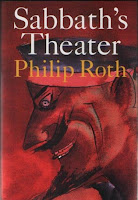
Indeed, I hate Sabbath’s Theater much as I hated The Dying Animal. In Roth’s hands, themes of sexuality rankle with me. Adultery is glorified as the only real type of love, where both partners are free. (Except it never really works out well for the aging buccaneer.) His emphasis on sexuality seems wishful rather than a fully formed theory about people. As is imagined sex with young girls and prostitutes and maids were some Freudian projection of his penis, and thus his self-worth. Yet he buys into conventional morality just enough to use its labels of ‘bad girl’ and ‘satanic lust’ to great effect. Interestingly, sex ultimately does not offer his characters salvation. Maybe conflating Roth and his characters is a mistake?

I do not identify with, and in fact hate, the protagonist of
Sabbath’s Theater, which is a problem in a character-driven novel. Hate is no light word, and I think for Roth to inspire such a reactions in me he must be doing something right.
Sabbath’s Theater is driven by the death of a great mistress and realization that Sabbath has nothing left. Sabbath, a puppeteer before he became an arthritic, lecherous old man, attempts to deal with this much like a mental patient.
Sabbath’s (and Roth’s for all I can see) merit is a brutal honesty and fluency when describing life without money or friends or hope, when all the women you love have died, and the feeble desires of a fading penis become more than solace but life itself. Despite what you might think, Sabbath needs no pity from you, dear Reader, and Roth accomplished something when he created a character so repulsive that even hearing of his brother’s death and mother’s tragedy doesn’t redeem him somewhat. Theories on the glories of free love, love you pay for, and love with those underage fall much like self-justifications on these deaf ears.
As to recommending these books, rarely have I enjoyed reading something so little. Yet both The Dying Animal and Sabbath’s Theater are capably done. The characters are rich and interesting, and the harsh, jaded take on humanity is as humorous as it is dour. Philip Roth is an accomplished writer with a great knowledge of the nuances of people; I just happen to dislike his people. Hating his novels makes me wonder if there’s something wrong with me….
 To my own surprise, I have finished a good contemporary novel. I suspected it might be one, but then I was warned it got slow in the middle. I reserved judgement until I shut the covers last night. Bel Canto is an engaging and graceful read by award-winner Ann Patchett.
To my own surprise, I have finished a good contemporary novel. I suspected it might be one, but then I was warned it got slow in the middle. I reserved judgement until I shut the covers last night. Bel Canto is an engaging and graceful read by award-winner Ann Patchett.
 To my own surprise, I have finished a good contemporary novel. I suspected it might be one, but then I was warned it got slow in the middle. I reserved judgement until I shut the covers last night. Bel Canto is an engaging and graceful read by award-winner Ann Patchett.
To my own surprise, I have finished a good contemporary novel. I suspected it might be one, but then I was warned it got slow in the middle. I reserved judgement until I shut the covers last night. Bel Canto is an engaging and graceful read by award-winner Ann Patchett.




